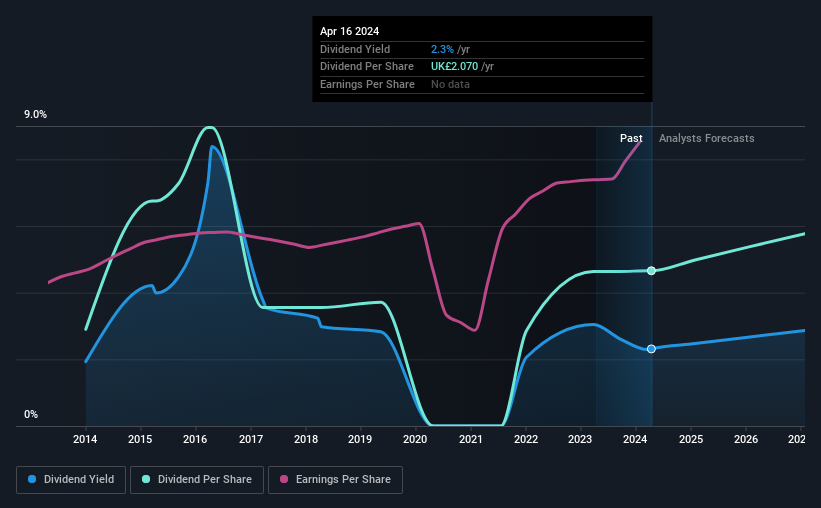NEXT (LON:NXT) Is Increasing Its Dividend To £1.41
NEXT plc's (LON:NXT) dividend will be increasing from last year's payment of the same period to £1.41 on 1st of August. This will take the dividend yield to an attractive 2.3%, providing a nice boost to shareholder returns.
Check out our latest analysis for NEXT
NEXT's Payment Has Solid Earnings Coverage
A big dividend yield for a few years doesn't mean much if it can't be sustained. However, NEXT's earnings easily cover the dividend. This means that most of its earnings are being retained to grow the business.
Looking forward, earnings per share is forecast to rise by 4.8% over the next year. If the dividend continues along recent trends, we estimate the payout ratio will be 31%, which is in the range that makes us comfortable with the sustainability of the dividend.
Dividend Volatility
While the company has been paying a dividend for a long time, it has cut the dividend at least once in the last 10 years. Since 2014, the annual payment back then was £1.29, compared to the most recent full-year payment of £2.07. This implies that the company grew its distributions at a yearly rate of about 4.8% over that duration. It's encouraging to see some dividend growth, but the dividend has been cut at least once, and the size of the cut would eliminate most of the growth anyway, which makes this less attractive as an income investment.
NEXT Could Grow Its Dividend
Given that the dividend has been cut in the past, we need to check if earnings are growing and if that might lead to stronger dividends in the future. NEXT has impressed us by growing EPS at 8.5% per year over the past five years. NEXT definitely has the potential to grow its dividend in the future with earnings on an uptrend and a low payout ratio.
We Really Like NEXT's Dividend
Overall, we think this could be an attractive income stock, and it is only getting better by paying a higher dividend this year. Earnings are easily covering distributions, and the company is generating plenty of cash. Taking this all into consideration, this looks like it could be a good dividend opportunity.
Companies possessing a stable dividend policy will likely enjoy greater investor interest than those suffering from a more inconsistent approach. Still, investors need to consider a host of other factors, apart from dividend payments, when analysing a company. Taking the debate a bit further, we've identified 3 warning signs for NEXT that investors need to be conscious of moving forward. Is NEXT not quite the opportunity you were looking for? Why not check out our selection of top dividend stocks.
Have feedback on this article? Concerned about the content? Get in touch with us directly. Alternatively, email editorial-team (at) simplywallst.com.
This article by Simply Wall St is general in nature. We provide commentary based on historical data and analyst forecasts only using an unbiased methodology and our articles are not intended to be financial advice. It does not constitute a recommendation to buy or sell any stock, and does not take account of your objectives, or your financial situation. We aim to bring you long-term focused analysis driven by fundamental data. Note that our analysis may not factor in the latest price-sensitive company announcements or qualitative material. Simply Wall St has no position in any stocks mentioned.

 Yahoo Finance
Yahoo Finance 
